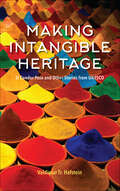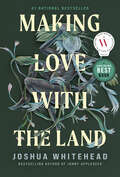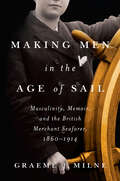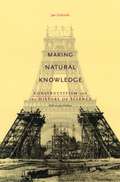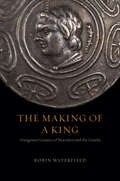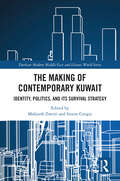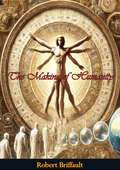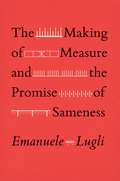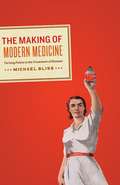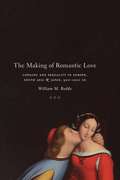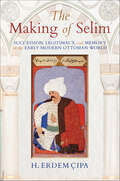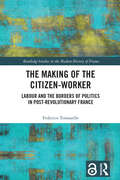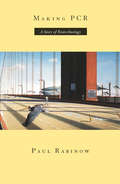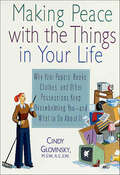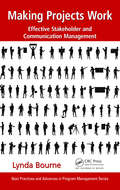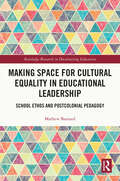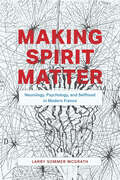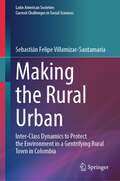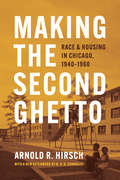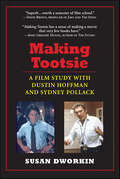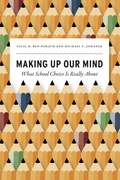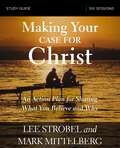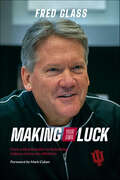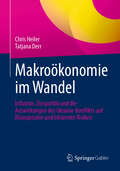- Table View
- List View
Making Intangible Heritage: El Condor Pasa and Other Stories from UNESCO
by Valdimar Tr. HafsteinIn Making Intangible Heritage, Valdimar Tr. Hafstein—folklorist and official delegate to UNESCO—tells the story of UNESCO's Intangible Heritage Convention. In the ethnographic tradition, Hafstein peers underneath the official account, revealing the context important for understanding UNESCO as an organization, the concept of intangible heritage, and the global impact of both. Looking beyond official narratives of compromise and solidarity, this book invites readers to witness the diplomatic jostling behind the curtains, the making and breaking of alliances, and the confrontation and resistance, all of which marked the path towards agreement and shaped the convention and the concept.Various stories circulate within UNESCO about the origins of intangible heritage. Bringing the sensibilities of a folklorist to these narratives, Hafstein explores how they help imagine coherence, conjure up contrast, and provide charters for action in the United Nations and on the ground. Examining the international organization of UNESCO through an ethnographic lens, Hafstein demonstrates how concepts that are central to the discipline of folklore gain force and traction outside of the academic field and go to work in the world, ultimately shaping people's understanding of their own practices and the practices themselves. From the cultural space of the Jemaa el-Fna marketplace in Marrakech to the Ise Shrine in Japan, Making Intangible Heritage considers both the positive and the troubling outcomes of safeguarding intangible heritage, the lists it brings into being, the festivals it animates, the communities it summons into existence, and the way it orchestrates difference in modern societies.
Making Love with the Land: Essays
by Joshua Whitehead#1 NATIONAL BESTSELLERFINALIST FOR THE HILARY WESTON WRITERS' TRUST PRIZE FOR NONFICTIONMuch-anticipated non-fiction from the author of the Giller-longlisted, GG-shortlisted and Canada Reads-winning novel Jonny Appleseed.&“Thrillingly cerebral. . . . Delivered with virtuoso aplomb.&” —The New York TimesIn the last few years, following the publication of his debut novel Jonny Appleseed, Joshua Whitehead has emerged as one of the most exciting and important new voices on Turtle Island. Now, in this first non-fiction work, Whitehead brilliantly explores Indigeneity, queerness, and the relationships between body, language and land through a variety of genres (essay, memoir, notes, confession). Making Love with the Land is a startling, heartwrenching look at what it means to live as a queer Indigenous person "in the rupture" between identities. In sharp, surprising, unique pieces—a number of which have already won awards—Whitehead illuminates this particular moment, in which both Indigenous and non-Indigenous peoples are navigating new (and old) ideas about "the land." He asks: What is our relationship and responsibility towards it? And how has the land shaped our ideas, our histories, our very bodies?Here is an intellectually thrilling, emotionally captivating love song—a powerful revelation about the library of stories land and body hold together, waiting to be unearthed and summoned into word.
Making Men in the Age of Sail: Masculinity, Memoir, and the British Merchant Seafarer, 1860–1914
by Graeme J. MilneMyths and stereotypes surrounding seafarers in the Age of Sail persist to this day. Sailors were celebrated for their courage, strength, and skill, yet condemned for militancy, vice, and fecklessness. As sail gave way to steam, sailing-ship mariners became nostalgic symbols of maritime prowess and heritage, representing a timeless, heroic masculinity in an era when the modernizing industrial world was challenging assumptions about gender, class, work, and society.Drawing on British seafaring memoirs from the late nineteenth century, Making Men in the Age of Sail argues that maritime writing moulded the reading public’s image of the merchant seaman. Authors chronicled their lives as they grew from boy sailors to trained seafarers, telling colourful tales of the men they worked with – most never doubted that the sailing ship had made them better men. Their testimony reinforced and preserved conservative perspectives on seafaring manhood as Britain’s economic and technological priorities continued to evolve in the new steamship age.Offering a gender analysis of the image of the seafarer, Making Men in the Age of Sail brings the history of British sailors into wider debates about modernity and masculinity.
Making Natural Knowledge: Constructivism and the History of Science
by Jan GolinskiArguably the best available introduction to constructivism, a research paradigm that has dominated the history of science for the past forty years, Making Natural Knowledge reflects on the importance of this theory, tells the history of its rise to prominence, and traces its most important tensions. Viewing scientific knowledge as a product of human culture, Jan Golinski challenges the traditional trajectory of the history of science as steady and autonomous progress. In exploring topics such as the social identity of the scientist, the significance of places where science is practiced, and the roles played by language, instruments, and images, Making Natural Knowledge sheds new light on the relations between science and other cultural domains. "A standard introduction to historically minded scholars interested in the constructivist programme. In fact, it has been called the 'constructivist's bible' in many a conference corridor."—Matthew Eddy, British Journal for the History of Science
The Making of a King: Antigonus Gonatas of Macedon and the Greeks
by Robin WaterfieldIn the third century BCE, the ancient kingdom of Macedon held dominion over mainland Greece, but it was rapidly descending into chaos. After Alexander the Great’s death, several of his successors contended for the Macedonian throne, and amid the tumult the Celts launched a massive invasion, ravaging and plundering Macedon and northern Greece for years. The Celts finally met their defeat at the hands of Antigonus Gonatas, son of one of Alexander’s successors. An exceptional statesman and artful strategist, Antigonus protected Macedon and its Greek territories against aggressors coming from every direction. After almost fifty years of chaos brought on by Alexander’s death, Antigonus stabilized Macedon and Greece and laid the foundation for a long but troubled reign. In this book, distinguished historian Robin Waterfield draws on his deep understanding of Greek history to bring us into the world of this complicated, splintered empire. He shows how, while Antigonus was confirming his Macedonian rule through constitutional changes, the Greeks were making moves toward independence. Two great confederacies of Greek cities emerged, forming powerful blocs that had the potential to resist the power of Macedon. The Making of a King charts Antigonus’s conflicts with the Greeks and with his perennial enemy, Ptolemy of Egypt. But Antigonus’s diplomatic and military successes were not enough to secure peace, and in his final years he saw his control of Greece whittled away by rebellion and the growing power of the Greek confederacies. Macedon’s lack of firm control over Greece ultimately made it possible for Rome to take its place as the arbiter of the Greeks’ future. The Making of a King is Waterfield’s third volume about the Greeks in the era after Alexander the Great. Completing the story begun in his previous two books, Dividing the Spoils and Taken at the Flood, it brings Antigonus and his turbulent era to life. With The Making of a King—the first book in more than a century to tell in full the story of Antigonus Gonatas’s reign—this fascinating figure finally receives his due.
The Making of Contemporary Kuwait: Identity, Politics, and its Survival Strategy (Durham Modern Middle East and Islamic World Series)
by Mahjoob Zweiri and Sinem CengizThis book explores the contemporary history, governance, foreign policy, political economy, culture, and society of Kuwait. It highlights the dynamics of the country, putting forward both an overview of each subject covered and new research findings. It begins by providing a historical understanding of state formation and goes on to examine state structure, including the ruling monarchy, state legitimacy, and the creation of the Constitution and the National Assembly. It considers foreign policy, including the tools of diplomacy, the state’s regional and international approach, and the factors that have formed and reformed Kuwait’s strategic policy in the global arena. It assesses the economy, including rentierism, the labour market both for locals and for migrants, the class system, and the process of Kuwaitization; and it discusses Kuwaiti society and national identity, as well as investigates issues of women, civil society, youth, and the Bidoon minority. Overall, the book provides a full and detailed analysis of contemporary Kuwait and of the factors which are bringing about new developments.
The Making of Humanity
by Robert BriffaultExplore the profound forces and pivotal events that have shaped human civilization with Robert Briffault's The Making of Humanity. This thought-provoking and comprehensive work delves into the cultural, intellectual, and social developments that have defined the human experience, offering readers an insightful and engaging narrative of humanity's journey through history.Robert Briffault, a distinguished historian, anthropologist, and sociologist, meticulously examines the factors that have contributed to the development of human society. In The Making of Humanity, Briffault presents a sweeping analysis of the evolution of human culture, tracing the origins and growth of key concepts such as science, art, religion, and social organization.Briffault's work stands out for its interdisciplinary approach, drawing on evidence from a wide range of fields including history, anthropology, sociology, and philosophy. His narrative covers significant milestones in human development, from the dawn of civilization and the rise of ancient cultures to the transformative impacts of the Renaissance, the Enlightenment, and the Industrial Revolution.The Making of Humanity explores the intellectual revolutions that have propelled humanity forward, highlighting the contributions of great thinkers, inventors, and artists who have shaped the course of history. Briffault also addresses the complex interplay between human progress and the social and environmental challenges that have arisen along the way.Join Robert Briffault as he unravels the story of humanity's ascent, examining the triumphs and trials that have defined our species. The Making of Humanity is a timeless exploration of the human condition, offering readers a deeper appreciation of the cultural and intellectual legacy that continues to shape our world.
The Making of Measure and the Promise of Sameness
by Emanuele LugliAn interdisciplinary history of standardized measurements. Measurement is all around us—from the circumference of a pizza to the square footage of an apartment, from the length of a newborn baby to the number of miles between neighboring towns. Whether inches or miles, centimeters or kilometers, measures of distance stand at the very foundation of everything we do, so much so that we take them for granted. Yet, this has not always been the case. This book reaches back to medieval Italy to speak of a time when measurements were displayed in the open, showing how such a deceptively simple innovation triggered a chain of cultural transformations whose consequences are visible today on a global scale. Drawing from literary works and frescoes, architectural surveys, and legal compilations, Emanuele Lugli offers a history of material practices widely overlooked by historians. He argues that the public display of measurements in Italy’s newly formed city republics not only laid the foundation for now centuries-old practices of making, but also helped to legitimize local governments and shore up church power, buttressing fantasies of exactitude and certainty that linger to this day. This ambitious, truly interdisciplinary book explains how measurements, rather than being mere descriptors of the real, themselves work as powerful molds of ideas, affecting our notions of what we consider similar, accurate, and truthful.
The Making of Modern Medicine: Turning Points in the Treatment of Disease
by Michael BlissAt the dawn of the twenty-first century, we have become accustomed to medical breakthroughs and conditioned to assume that, regardless of illnesses, doctors almost certainly will be able to help—not just by diagnosing us and alleviating our pain, but by actually treating or even curing diseases, and significantly improving our lives. For most of human history, however, that was far from the case, as veteran medical historian Michael Bliss explains in The Making of Modern Medicine. Focusing on a few key moments in the transformation of medical care, Bliss reveals the way that new discoveries and new approaches led doctors and patients alike to discard fatalism and their traditional religious acceptance of suffering in favor of a new faith in health care and in the capacity of doctors to treat disease. He takes readers in his account to three turning points—a devastating smallpox outbreak in Montreal in 1885, the founding of the Johns Hopkins Hospital and Medical School, and the discovery of insulin—and recounts the lives of three crucial figures—researcher Frederick Banting, surgeon Harvey Cushing, and physician William Osler—turning medical history into a fascinating story of dedication and discovery.Compact and compelling, this searching history vividly depicts and explains the emergence of modern medicine—and, in a provocative epilogue, outlines the paradoxes and confusions underlying our contemporary understanding of disease, death, and life itself.
The Making of Romantic Love: Longing and Sexuality in Europe, South Asia & Japan, 900–1200 CE (Chicago Studies In Practices Of Meaning Ser.)
by William M. ReddyIn the twelfth century, the Catholic Church attempted a thoroughgoing reform of marriage and sexual behavior aimed at eradicating sexual desire from Christian lives. Seeking a refuge from the very serious condemnations of the Church and relying on a courtly culture that was already preoccupied with honor and secrecy, European poets, romance writers, and lovers devised a vision of love as something quite different from desire. Romantic love was thus born as a movement of covert resistance. In The Making of Romantic Love: Longing and Sexuality in Europe, South Asia, and Japan, William M. Reddy illuminates the birth of a cultural movement that managed to regulate selfish desire and render it innocent—or innocent enough. Reddy strikes out from this historical moment on an international exploration of love, contrasting the medieval development of romantic love in Europe with contemporaneous eastern traditions in Bengal and Orissa, and in Heian Japan from 900-1200 CE, where one finds no trace of an opposition between love and desire. In this comparative framework, Reddy tells an appealing tale about the rise and fall of various practices of longing, underscoring the uniqueness of the European concept of sexual desire.
The Making of Selim: Succession, Legitimacy, and Memory in the Early Modern Ottoman World
by H. Erdem CipaThe father of the legendary Ottoman sultan Suleyman the Magnificent, Selim I ("The Grim") set the stage for centuries of Ottoman supremacy by doubling the size of the empire. Conquering Eastern Anatolia, Syria, and Egypt, Selim promoted a politicized Sunni Ottoman* identity against the Shiite Safavids of Iran, thus shaping the early modern Middle East. Analyzing a wide array of sources in Ottoman-Turkish, Persian, and Arabic, H. Erdem Cipa offers a fascinating revisionist reading of Selim's rise to power and the subsequent reworking and mythologizing of his persona in 16th- and 17th-century Ottoman historiography. In death, Selim continued to serve the empire, becoming represented in ways that reinforced an idealized image of Muslim sovereignty in the early modern Eurasian world.
The Making of the Citizen-Worker: Labour and the Borders of Politics in Post-revolutionary France (Routledge Studies in the Modern History of France)
by Federico TomaselloOver the course of the 19th century, European societies started thinking of themselves as “civilisations of work.” In the wake of the political and industrial revolutions, labour as a human activity and condition gradually came to embody a general principle of order, progress, and governance. How did work become so central to our systems of citizenship and social recognition?The book addresses this question by considering the French context in the long transition between the 1789 and 1848 revolutions and focusing on a specific “fragment” of history in the early 1830s marked by a pandemic crisis and the first consequences of industrialisation. It combines the analysis of both political institutions and social movements to retrace the rise of a labour-based social contract revolving around the “citizen-worker” as the quintessential subject of rights.The first part of the book highlights the role played by the genesis of the modern social sciences and analyses it as a political process that established work as an “object” of governance and scientific investigation, thus fostering pioneering measures of welfare centred on work conditions. The second part focuses on the emergence of the concept of “working class” and the modern labour movement, which structured the world of work as a collective political “subject.”Chapter 2 of this book is freely available as a downloadable Open Access PDF at http://www.taylorfrancis.com under a Creative Commons Attribution-Non Commercial-No Derivatives (CC-BY-NC-ND) 4.0 license.
The Making of the Modern Corporation: The Casa di San Giorgio and its Legacy (1446-1720) (Routledge Research in Early Modern History)
by Carlo TavianiThis book traces the origins of a financial institution, the modern corporation, in Genoa and reconstructs its diffusion in England, the Netherlands, and France. At its inception, the Casa di San Giorgio (1407–1805) was entrusted with managing the public debt in Genoa. Over time, it took on powers we now ascribe to banks and states, accruing financial characteristics and fiscal, political, and territorial powers. As one of the earliest central banks, it ruled territories and local populations for almost a century. It controlled strategic Genoese possessions near and far, including the island of Corsica, the city of Famagusta (in Cyprus), and trading posts in Crimea, the Black Sea, the Lunigiana in northern Tuscany, and various towns in Liguria. In the early sixteenth century, in his Florentine Histories (Book VIII, Chapter 29), Niccolò Machiavelli was the first to analyze the relationship between the Casa di San Giorgio’s financial and territorial powers, declaring its possession of territories as the basis of its ascendancy. Later, the founders of some of the earliest corporations, including the Dutch East India Company (1602), the Bank of England (1694), and John Law’s Mississippi Company (1720) in France, referenced the model of the Casa di San Giorgio.
Making PCR: A Story of Biotechnology
by Paul RabinowMaking PCR is the fascinating, behind-the-scenes account of the invention of one of the most significant biotech discoveries in our time—the polymerase chain reaction. Transforming the practice and potential of molecular biology, PCR extends scientists' ability to identify and manipulate genetic materials and accurately reproduces millions of copies of a given segment in a short period of time. It makes abundant what was once scarce—the genetic material required for experimentation.Making PCR explores the culture of biotechnology as it emerged at Certus Corporation during the 1980s and focuses on its distinctive configuration of scientific, technical, social, economic, political, and legal elements, each of which had its own separate trajectory over the preceding decade. The book contains interviews with the remarkable cast of characters who made PCR, including Kary Mullin, the maverick who received the Nobel prize for "discovering" it, as well as the team of young scientists and the company's business leaders. This book shows how a contingently assembled practice emerged, composed of distinctive subjects, the site where they worked, and the object they invented. "Paul Rabinow paints a . . . picture of the process of discovery in Making PCR: A Story of Biotechnology [and] teases out every possible detail. . . . Makes for an intriguing read that raises many questions about our understanding of the twisting process of discovery itself."—David Bradley, New Scientist "Rabinow's book belongs to a burgeoning genre: ethnographic studies of what scientists actually do in the lab. . . . A bold move."—Daniel Zalewski, Lingua Franca "[Making PCR is] exotic territory, biomedical research, explored. . . . Rabinow describes a dance: the immigration and repatriation of scientists to and from the academic and business worlds."—Nancy Maull, New York Times Book Review
Making Peace with the Things in Your Life: Why Your Papers, Books, Clothes, and Other Possessions Keep Overwhelming You—and What to Do About It
by Cindy GlovinskyA guide to understanding why your possessions keep overwhelming you and what to do about it, written by a professional organizer and psychotherapist.Do you spend much of your time struggling against the growing ranks of papers, books, clothes, housewares, mementos, and other possessions that seem to multiply when you're not looking? Do these inanimate objects, the hallmarks of busy modern life, conspire to fill up every inch of your space, no matter how hard you try to get rid of some of them and organize the rest? Do you feel frustrated, thwarted, and powerless in the face of this ever-renewing mountain of stuff? Help is on the way. Cindy Glovinsky, practicing psychotherapist and personal organizer, is uniquely qualified to explain this nagging, even debilitating problem -- and to provide solutions that really work. Writing in a supportive, nonjudmental tone, Glovinsky uses humorous examples, questionnaires, and exercises to shed light on the real reasons why we feel so overwhelmed by papers and possessions and offers individualized suggestions tailored to specific organizing problems. Whether you're drowning in clutter or just looking for a new way to deal with the perennial challenge of organizing and managing material things, this fresh and reassuring approach is sure to help. Making Peace with the Things in Your Life will help you cut down on your clutter and cut down on your stress!
Making Projects Work: Effective Stakeholder and Communication Management (Best Practices in Portfolio, Program, and Project Management)
by Lynda BourneThis book provides a framework for understanding and managing factors required for achieving successful project and program outcomes. It presents guidelines to help readers develop an understanding of governance and its connection to strategy as the starting point for decisions on what work needs to be done. The book describes how to craft appropriate communication strategies to develop and maintain successful relationships with stakeholders. It highlights the strengths and weaknesses of existing project controls and outlines effective communication techniques for managing expectations and acquiring the support required for successful delivery.
Making Space for Cultural Equality in Educational Leadership: School Ethos and Postcolonial Pedagogy (Routledge Research in Decolonizing Education)
by Mathew BarnardThis book foregrounds postcolonial theory as a lens through which to explore the concept of ‘global heritage’ and argues that the meso-level spaces of institutional ethos and cultural pedagogy must take an active role in the pursuit of cultural equality.Through interviews and accounts of observational, empirical data, chapters draw attention to how the cultural capital of Global Majority students is institutionally positioned as a racialised and inferior cultural capital that is constantly required to ‘prove itself’ in the Western school. Ultimately, the book contributes to international discussion on decolonising education and the spaces within in order to enact change, further the field, and more precisely to recognise the importance of global heritage as vital to a transformative understanding of the West’s cultural identity within a globalised world.This book will appeal to scholars, researchers and post-graduate researchers in the fields of multicultural education, school leadership, management and administration, and education policy and politics more broadly. Those interested in social justice, ideas of cultural and racial equality, and the sociology of education more broadly will also benefit from the volume.
Making Spirit Matter: Neurology, Psychology, and Selfhood in Modern France
by Larry Sommer McGrathThe connection between mind and brain has been one of the most persistent problems in modern Western thought; even recent advances in neuroscience haven’t been able to explain it satisfactorily. Historian Larry Sommer McGrath’s Making Spirit Matter studies how a particularly productive and influential group of nineteenth- and early twentieth-century French thinkers attempted to solve this puzzle by showing the mutual dependence of spirit and matter. The scientific revolution taking place at this point in history across disciplines, from biology to psychology and neurology, located our mental powers in the brain and offered a radical reformulation of the meaning of society, spirit, and the self. Tracing connections among thinkers such as Henri Bergson, Alfred Fouillée, Jean-Marie Guyau, and others, McGrath plots alternative intellectual movements that revived themes of creativity, time, and experience by applying the very sciences that seemed to undermine metaphysics and religion. Making Spirit Matter lays out the long legacy of this moment in the history of ideas and how it might renew our understanding of the relationship between mind and brain today.
Making the Rural Urban: Inter-Class Dynamics to Protect the Environment in a Gentrifying Rural Town in Colombia (Latin American Societies)
by Sebastián Felipe Villamizar-SantamaríaThis book takes the small rural town of La Calera, in the outskirts of the Colombian capital of Bogotá, as a case study to analyze how residents from different social classes – wealthier ex-urban newcomers arriving to traditionally peasant and rural areas – interact to decide how nature will be used in the face of further urban expansion. Contrary to the conflicts in other gentrification cases, including those of “green” gentrification, this book shows how newcomers and longtimers in La Calera use environmental concerns to bridge social class rifts and push the state to provide water, public space, and decision-making power. Residents see abundant ecological resources like water and land around them, but they do not have access to aqueducts, green public space or power over planning decisions affecting the distribution of these resources. As a response, and to challenge the state more effectively, newcomers and longtimers create inter-class alliances through what the author calls third nature: the way residents try to both protect and keep using existing ecological goods. To do so, despite high levels of class inequality, residents had a similar goal of protecting ecological resources around them by intervening in the physical and political landscapes against a state that induces scarcity, selectively enforcing environmental policies to the detriment of Calerunos. As cities all around the Global South continue to grow, urban expansion posits a threat to the environment by transforming agricultural and protected areas into denser residential or touristic spaces. Moreover, as natural resources become scarcer in the face of climate change, inequality might further existing environmental privileges and vulnerabilities. By examining closely how Calerunos bridge class inequalities for environmental reasons, this case highlights processes that inform other gentrifying rural spaces around the world.
Making the Second Ghetto: Race & Housing in Chicago, 1940–1960 (Historical Studies of Urban America)
by Arnold R. HirschFirst published in 1983 and praised by the likes of Ta-Nehisi Coates and Thomas Sugrue, Arnold R. Hirsch’s Making the Second Ghetto is the rare book that has only become more piercingly prescient over the years. Hirsch’s classic and groundbreaking work of urban history is a revelatory look at Chicago in the decades after the Great Depression, a period when the city dealt with its rapidly growing Black population not by working to abolish its stark segregation but by expanding and solidifying it. Even as the civil rights movement rose to prominence, Chicago exploited a variety of methods of segregation—including riots, redevelopment, and a host of new legal frameworks—that provided a national playbook for the emergence of a new kind of entrenched inequality. Hirsch’s chronicle of the strategies employed by ethnic, political, and business interests in reaction to the Great Migration of Southern Blacks in the mid-twentieth century makes startingly clear how the violent reactions of an emergent white population found common ground with policy makers to segregate first a city and then the nation. This enlarged edition of Making the Second Ghetto features a visionary afterword by historian N. D. B. Connolly, explaining why Hirsch’s book still crackles with “blistering relevance” for contemporary readers.
Making Tootsie: A Film Study with Dustin Hoffman and Sydney Pollack (Shooting Script)
by Susan Dworkin“A perceptive and provocative work.”—Los Angeles Times“A stunning job of research, observation and reporting.”—Larry Gelbart, co-writer of Tootsie and writer on TV’s “M*A*S*H*”“This fluid, marvelously detailed book goes a long way toward explaining why Tootsie has already achieved a reputation as a classic film comedy.” —PeopleMaking Tootsie is back, three decades after the creation of the blockbuster Hollywood motion picture that the American Film Institute rated as #2 on its list of the 100 Best Comedies of All Time (second only to Some Like it Hot). Playwright, author, and Ms. magazine contributing writer Susan Dworkin was granted unprecedented access to the film set, the cast, and the crew during the filming and through post-production of the 1982 classic, and her riveting, detailed chronicle offers a fascinating window into the art of movie making—as well as painting indelible portraits of the two main men who made Tootsie happen: director Sidney Pollack and star Dustin Hoffman. No movie buff, film historian, student, or fan will want to miss Making Tootsie.
Making Up Our Mind: What School Choice Is Really About (History and Philosophy of Education Series)
by Sigal R. Ben-Porath Michael C. JohanekIf free market advocates had total control over education policy, would the shared public system of education collapse? Would school choice revitalize schooling with its innovative force? With proliferating charters and voucher schemes, would the United States finally make a dramatic break with its past and expand parental choice? Those are not only the wrong questions—they’re the wrong premises, argue philosopher Sigal R. Ben-Porath and historian Michael C. Johanek in Making Up Our Mind. Market-driven school choices aren’t new. They predate the republic, and for generations parents have chosen to educate their children through an evolving mix of publicly supported, private, charitable, and entrepreneurial enterprises. The question is not whether to have school choice. It is how we will regulate who has which choices in our mixed market for schooling—and what we, as a nation, hope to accomplish with that mix of choices. Looking beyond the simplistic divide between those who oppose government intervention and those who support public education, the authors make the case for a structured landscape of choice in schooling, one that protects the interests of children and of society, while also identifying key shared values on which a broadly acceptable policy could rest.
Making Your Case for Christ Bible Study Guide: An Action Plan for Sharing What you Believe and Why
by Lee Strobel Mark MittelbergIn his bestselling book The Case for Christ, Lee Strobel retraced his spiritual journey from atheism to faith by showing how the evidence he obtained from experts in the field of history, archaeology, and ancient manuscripts led him to the verdict that Jesus truly was the Son of God.Now, in this six-week training course, Lee and coauthor Mark Mittelberg will equip you with practical tools to equip you articulate this same message to your unsaved friends and present evidence that backs up Jesus' claims and credentials.As you go through the course, you will discover how to:Help your unsaved friends and family members open up to consider the case for ChristDescribe your own personal journey with Christ and how it has impacted youShare with confidence about the biblical record of Christ—that Jesus was realPresent the evidence for the resurrection of Christ—that Jesus died and was raised to lifeExplain the central message of Christ in an authentic and compelling wayHelp your unsaved friends and family members respond to the truth of JesusSessions include:Helping Friends Consider the Case for ChristDescribing Your Own Journey with ChristBacking Up the Biblical Record of ChristPresenting Evidence for the Resurrection of ChristExplaining the Central Message of ChristEncouraging Friends to Follow ChristDesigned for use with Making Your Case for Christ Video Study (9780310095156), sold separately.
Making Your Own Luck: From a Skid Row Bar to Rebuilding Indiana University Athletics
by Fred GlassOne man's odyssey from skid row to rebuilding a major collegiate sports program. In Making Your Own Luck, former Indiana University athletic director Fred Glass recounts how even a self-described "knucklehead" learned to be prepared to recognize and seize opportunities and thus make his own luck through life. Growing up in a skid row bar, having an alcoholic father, struggling with anxiety and self-doubt, and making his share of stupid mistakes, Glass had much to contend with in early life. However, supported by socially enlightened parents, a Jesuit education, and his soulmate, Barbara, his odyssey has led him to serve a mayor, a governor, a senator, and even a president. With great humor and insightful reflection, Glass details how he helped keep the Colts in Indianapolis—he spearheaded a massive convention center expansion and the building of Lucas Oil Stadium and even helped to attract the Super Bowl to his hometown. Any of these accomplishments individually would be more than enough to call Glass's career a resounding success, but they were only the beginning. In the latest stage of his journey, Glass led the rebuilding of the athletic program of his beloved alma mater, Indiana University. Featuring a foreword from IU alumnus and owner of the Dallas Mavericks, Mark Cuban, Making Your Own Luck is a must-read not only for Indiana sports fans, but for anyone that recognizes the importance of preparation, opportunity and action in creating your own success.
Makroökonomie im Wandel: Inflation, Zinspolitik und die Auswirkungen des Ukraine-Konflikts auf Bilanzposten und inhärente Risiken
by Tatjana Derr Chris HeilerDieses Buch analysiert, wie sich gegenwärtige Geschehnisse – die Covid-19-Pandemie, der Ukraine-Konflikt, die Inflation und die Leitzinsanpassungen – auf inhärente Risiken und Bilanzposten von Unternehmen auswirken. Der Schwerpunkt liegt auf einer theoretisch-deskriptiven Analyse, welche die tiefgreifenden Auswirkungen dieser makroökonomischen Phänomene auf inhärente Risikofaktoren umfassend beleuchtet. Danach folgt eine empirische Untersuchung ausgewählter Unternehmen des DAX-40-Index, um die in der Theorie vorhergesagten ökonomischen Entwicklungen zu validieren. Durch diese Verknüpfung von Theorie und Empirie werden nicht nur abstrakte Konzepte verstehbar gemacht, sondern auch die konkreten Auswirkungen auf Unternehmen und deren Bilanzen. Es unterstützt damit Wissenschaftler und Praktiker, Herausforderungen und Chancen in einem komplexen wirtschaftlichen Umfeld besser zu verstehen und etwaige Handlungsbedarfe für Unternehmen abzuleiten.
